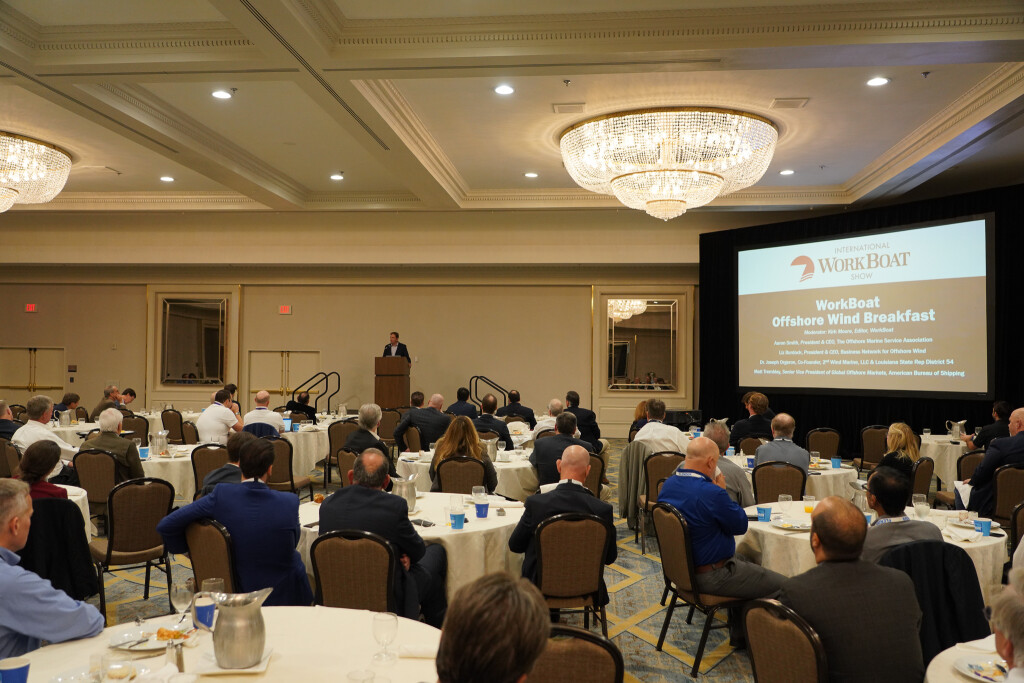As the Biden administration pushes on with its drive toward 30 gigawatts of offshore wind energy potential by 2030, so are U.S. offshore operators pressing their demands for strict enforcement of the nation’s maritime laws.
Sessions discussing offshore wind attracted big audiences at the International WorkBoat Show in December. One recurrent theme was impending shortages of suitable workboats for building and operating offshore wind turbine arrays — and whether the new industry requires using foreign-flag vessels.
“It’s claimed the Jones Act will halt offshore wind. I’m here to tell you that’s not true,” said Aaron Smith, president and CEO of the Offshore Marine Service Association.
Smith spoke out about what he sees as an impulse among some players in the wind sector to win exemptions from the Jones Act with its requirement for merchandise to be carried between U.S. points in U.S.-built, -owned and -crewed vessels.
“The U.S. maritime industry has always responded to the market,” Smith told audiences at the show. He cited how OMSA member companies built a new class of subsea construction vessels for the Gulf of Mexico oil and gas industry, resulting in a fully U.S. flag fleet.
Given “certainty and predictability,” U.S. operators have made those kinds of long-term investments in dredging vessels, and can do the same for wind, said Smith. “Some say we are too pure on the Jones Act. We wear that proudly too. A belief you can get around it, or a failure to enforce it,” will stop offshore wind development in U.S. waters, he cautioned.
Political support for the Jones Act is such that Congress amended the law to cover “valueless merchandise,” said Smith. That was one critique raised by OMSA in a recent report that cited use of a foreign-flag survey vessel to transport sea floor soil samples to shore in Virginia earlier this year.
Survey operators countered they followed guidance from U.S. Customs and Border Protection. Smith said it’s a problem of lawyers seeking exemptions.
“All of these little loopholes have been created by bureaucrats in private correspondence,” he said. “When certainty has been presented to the U.S. industry, we’ve always responded.”
CPB letters of interpretation, Smith said, are “a house of cards” that wind developers pursue at some political peril. The same goes for any attempts to evade Jones Act crewing requirements, as growing publicity about Northeast wind projects draws increased scrutiny from Congress, he added.
Smith’s brief address drew applause from the audience, where Gulf operators and suppliers were well-represented.
OMSA set the scene for that debate two week before, with its release of a report alleging operators of a foreign-flag geotechnical survey vessel had been in violation of the Jones Act while working on a Virginia offshore wind energy project.
The 264’x59’ vessel Geoquip Saentis, “a Chinese-built, Bahamian-flagged, Swiss-owned offshore supply vessel…operated for most of 2020 and 2021 in U.S. offshore wind fields,” including survey work for the Dominion Energy Coastal Virginia Offshore Wind project and the Vineyard Wind project off southern New England, according to the 34-page paper addressed to top Coast Guard and U.S. Customs and Border Protection officials.
One key allegation in the paper is that seafloor soil samples transported by a foreign-flag survey vessel to shore for testing constitute “merchandise” as described in the Jones Act.
“The Geoquip Saentis has repeatedly transported and continues to transport merchandise between U.S. points, including transporting subsoil samples from points on the U.S. Outer Continental Shelf (“OCS”) to U.S. ports for testing,” OMSA stated. “That transportation violates the Jones Act.”
Operator Geoquip Marine replied in its own lengthy statement, disputing among other points the OMSA claim about Jones Act cargo violations.
“Geoquip Marine vessels do not transport cargo or merchandise. The Geoquip Saentis is an IGSV, it is dedicated to research, and has world-leading drilling technology and an onboard laboratory. It collects seabed data, allowing geotechnical parameters to be derived and supporting environmental research.
“Geoquip Marine has historically relied upon the longstanding position that research work of the type that it is specifically focused on analyzing the characteristics of the seabed is not covered by the provisions of the Jones Act.”
It looks like the historic Jones Act feuding between energy multinationals and U.S. operators in the Gulf of Mexico is coming to the East Coast.





